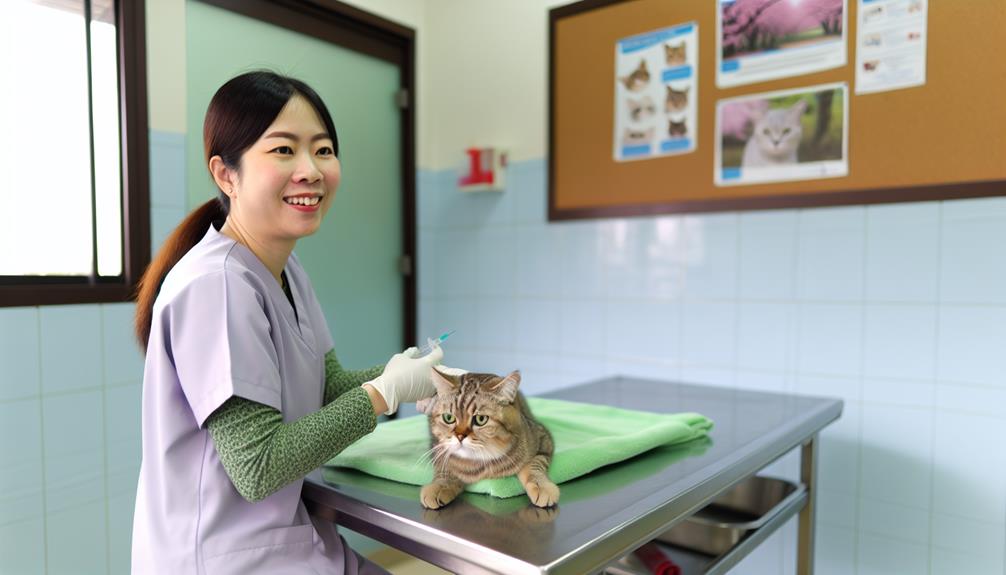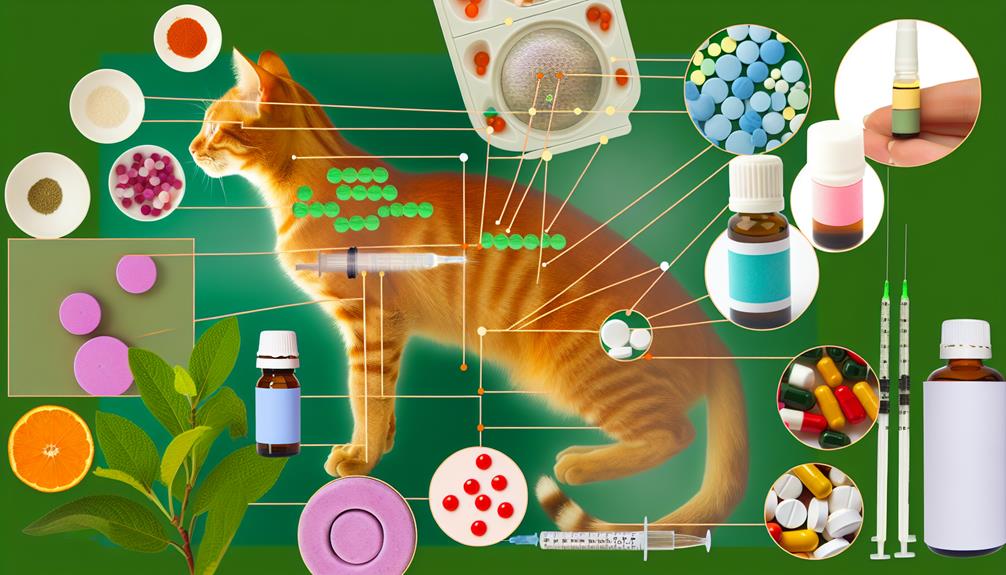Hey there, cat lovers! Today, we're going to talk about something super important for the health of your furry friends – cat vaccination boosters. Have you ever wondered why these booster shots are so crucial? Well, hold on to your whiskers because I'm about to spill the kibble! Booster shots help keep your cats' immune system strong and protect them from nasty diseases. But that's not all – in this article, we'll dive into five essential tips for cat vaccination boosters. We'll learn about the importance of booster shots, signs of vaccine failure, and much more. So, grab a comfy seat and let's get started on keeping your kitties healthy and happy!
Key Takeaways
Key Takeaways:
- Giving your cat their vaccination boosters is crucial for their health and happiness.
- Stick to the recommended schedule and know which vaccines are necessary for your cat.
- Watch for signs that the vaccines aren't working and make sure they are given correctly.
- Being a responsible pet owner means keeping your furry friend safe with proper vaccinations.
- By following these tips, you are taking care of your cat's well-being and protecting them from harmful diseases.
Importance of Booster Shots
Why Do Cats Need Booster Shots?
Boosters shots are like super-charged vaccines that help keep cats healthy and protected from dangerous diseases. But why do cats need these extra shots? Let's take a closer look:
- Reinforcing the immune response: Just like humans, cats can sometimes lose their immunity to diseases over time. Booster shots give their immune system a boost, making it stronger and better able to fight off infections.
- Keeping diseases at bay: Without regular boosters, cats can become vulnerable to serious diseases like feline distemper, feline leukemia, and rabies. These diseases can cause organ damage, neurological disorders, and even death in cats.
- Protecting other cats and humans: Unvaccinated cats can act as carriers of infectious diseases, putting not just themselves but also other cats and even humans at risk. By getting booster shots, cats help prevent the spread of these diseases.
To make sure your furry friend stays safe and healthy, it's important to follow the recommended vaccination schedule and get booster shots as advised by your veterinarian. Remember, regular booster shots are a crucial part of being a responsible pet owner and help your cat stay protected against preventable diseases.
Recommended Vaccination Schedule
Let's talk about keeping your cat healthy! One important way to do that is by making sure they get their vaccinations on time. Vaccines are like superpowers that protect your cat from dangerous diseases. But when should they get vaccinated? And are there any side effects? Let's find out!
First, it's important to know that vaccines can sometimes have side effects. Most of the time, these side effects are not serious and go away quickly. Your cat might have a little swelling where they got the shot or feel a bit tired. But don't worry, serious reactions are very rare. If you notice anything unusual after your cat gets vaccinated, make sure to tell your vet.
So, when should your cat get their shots? Well, there's a recommended schedule that your vet will follow. Here's a breakdown of the most common vaccinations and when they should be given:
- Feline Distemper (FVRCP) Vaccine:
- Kittens should get this vaccine at 6-8 weeks of age, with boosters every 3-4 weeks until they are 16 weeks old.
- Adult cats should get a booster shot every 1-3 years.
- Rabies Vaccine:
- Kittens should get their first rabies shot around 12 weeks of age, with a booster shot in 1 year.
- Adult cats should receive a rabies shot every 1-3 years, depending on local laws.
- Feline Leukemia Vaccine:
- Kittens should get their first shot around 9-12 weeks of age, with a booster shot in 3-4 weeks.
- Adult cats should receive a booster shot every 1-2 years if they are at risk.
Remember, these are just general guidelines, and your vet might recommend a different schedule based on your cat's individual needs.
Now, what if your cat has certain health conditions or is allergic to vaccines? In some cases, your vet might consider giving them exemptions from certain vaccinations. But it's crucial to talk to your vet about this. They can help you make the best decision for your cat's health.
Common Cat Vaccines
The Importance of Cat Vaccines: Protecting Your Feline Friend!
Did you know that vaccines are like superheroes for your cat's immune system? They help protect your furry friend from harmful diseases! But how do vaccines work? Well, they stimulate your cat's immune system to make special antibodies that fight off specific germs.
Here are some important things to know about cat vaccines:
Why are vaccines important?
- Vaccines are crucial for keeping your cat healthy and safe from dangerous diseases.
- They can prevent infections or make the symptoms milder if your cat does get sick.
Which vaccines are common for cats?
- Rabies vaccine: protects against the rabies virus, which can be deadly for cats and humans.
- Feline herpesvirus vaccine: guards against a common respiratory infection in cats.
- Feline calicivirus vaccine: helps prevent another respiratory infection that can make your cat feel really sick.
- Feline panleukopenia virus vaccine: shields your cat from a highly contagious and potentially fatal disease.
How are vaccines given?
- Kittens usually get a series of shots when they're young, followed by booster shots as they grow up.
- The shots are given by a veterinarian with a tiny needle, and it's usually quick and not too uncomfortable.
Are there any side effects?
- Most cats tolerate vaccines well, but they might have some mild side effects like a little soreness where the shot was given, temporary tiredness, or a mild fever.
- Serious reactions are rare, but it's always important to talk to your vet if you have any concerns.
Why should you follow a vaccination schedule?
- Following a recommended vaccination schedule ensures that your cat gets the right protection at the right time.
- It's an essential part of being a responsible cat owner and keeping your furry friend healthy and happy.
Signs of Vaccine Failure
Why do some cat vaccines fail to protect our furry friends?
Vaccines are an important tool in keeping our cats healthy, but sometimes they may not work as well as we hope. How can we tell if a vaccine has failed? Here are some signs to look out for:
- Adverse reactions: Sometimes, cats can have a bad reaction to a vaccine. These reactions can range from mild symptoms like swelling or lethargy to more serious ones like anaphylaxis, which can be life-threatening. Adverse reactions are rare, but it's important to take them seriously if they occur.
- Lack of immune response: When a vaccine is given to a cat, it's supposed to stimulate their immune system to produce antibodies, which help protect against diseases. But sometimes, the vaccine doesn't do its job and the cat doesn't develop enough antibodies. This can happen due to factors like improper storage or administration of the vaccine, or if the cat has pre-existing health conditions that weaken their immune system.
Tips for Proper Vaccine Administration
Tips for Giving Vaccines to Your Cat
Did you know that giving vaccines to your cat the right way can help protect them from diseases? It's true! But how do you make sure you're doing it properly? We've got some tips to help you out.
- Store vaccines properly: Keep vaccines in a cool and dry place, away from sunlight and extreme temperatures. This keeps them strong and effective.
- Handle with care: Follow the instructions from the vaccine manufacturer for mixing and giving the vaccine. Use sterile needles and syringes for each cat to prevent the spread of diseases.
- Watch for side effects: Most cats handle vaccines well, but some may have mild side effects like feeling tired, having a slight fever, or a little swelling where the shot was given. Allergic reactions are rare, but they can happen. If you see anything concerning, talk to your vet right away.
Frequently Asked Questions
Can My Cat Develop an Allergic Reaction to a Booster Shot?
Frequently Asked Questions About Cats and Allergic Reactions to Booster Shots
Q: Can cats have allergic reactions to booster shots?
A: Yes, cats can have allergic reactions to booster shots. Just like some people might be allergic to certain foods or medicines, cats can also have allergies. When they get a booster shot, their body might have an overreactive response, causing symptoms like swelling, itching, or trouble breathing.
Q: What are the signs of an allergic reaction in cats after a booster shot?
A: If your cat has an allergic reaction to a booster shot, you might notice signs like swelling around the injection site, redness, itchiness, or even difficulty breathing. It's important to keep an eye out for these symptoms and seek help from a veterinarian if you notice them.
Q: How can allergic reactions to booster shots in cats be treated?
A: If your cat has an allergic reaction to a booster shot, the treatment will depend on the severity of the symptoms. In mild cases, your vet may suggest giving your cat antihistamines to reduce the allergic response. However, in severe cases where your cat is having trouble breathing, emergency medical care may be needed.
Q: Are there any preventive measures to avoid allergic reactions to booster shots in cats?
A: To help prevent allergic reactions to booster shots in cats, your veterinarian may pre-screen your cat for allergies before giving the shot. This way, they can choose alternative vaccine options or take extra precautions if needed. It's always a good idea to discuss any concerns with your vet before your cat receives their booster shot.
Are There Any Side Effects or Risks Associated With Booster Shots?
Frequently Asked Questions:
Q: What are booster shots for cats?
A: Booster shots are additional vaccinations that help boost a cat's immunity against certain diseases. They're like a little extra protection to keep your furry friend healthy.
Q: Do booster shots have side effects?
A: Sometimes, booster shots can cause mild side effects like a little fever, your cat feeling tired, or some swelling where they got the shot. But don't worry, these symptoms usually go away on their own.
Q: Are there any serious risks with booster shots?
A: Serious risks with booster shots are very rare, but it's important to know about them. In really rare cases, cats might have a severe reaction called anaphylaxis, which can cause trouble breathing. There's also a small risk of getting a tumor at the injection site, but this is also very uncommon.
Q: Should I be worried about these side effects and risks?
A: It's normal to be concerned, but remember, the chances of having any serious problems from booster shots are extremely low. Vaccinations are important to protect your cat's health, and the benefits usually far outweigh the risks.
Q: What should I do if my cat has a reaction to a booster shot?
A: If you notice any unusual symptoms after your cat gets a booster shot, like trouble breathing or a big lump at the injection site, it's important to contact your veterinarian right away. They'll be able to provide the best advice and care for your cat.
Q: Can I skip booster shots to avoid side effects?
A: It's not recommended to skip booster shots because they're crucial for your cat's health. The side effects are usually mild and temporary, while the protection from diseases is long-lasting. Talk to your vet if you have concerns, they can address any worries you may have.
How Long Do the Effects of a Booster Shot Typically Last?
Frequently Asked Questions
Q: What is a booster shot?
A: A booster shot is an extra dose of a vaccine that you get after the first round of shots. It helps to make sure your immune system stays strong and protected against certain diseases.
Q: Do booster shots last forever?
A: No, booster shots don't last forever. The length of time they protect you can vary depending on the vaccine and the individual. But don't worry, booster shots are designed to extend the protection you get from the initial vaccination.
Q: Why do we need booster shots?
A: We need booster shots because our immune system can weaken over time. Booster shots help to remind our immune system how to fight off diseases and keep us healthy. They give our immune system a little "boost" to stay strong.
Q: How often do we need booster shots?
A: The timing of booster shots can be different for each vaccine. Some vaccines need boosters every few years, while others may only need one booster during your lifetime. Your doctor can tell you when you need your booster shots.
Q: Are booster shots safe?
A: Yes, booster shots are considered safe. Vaccines go through rigorous testing to make sure they are effective and don't cause harm. Side effects from booster shots are usually mild, like a sore arm or a slight fever. These side effects go away quickly.
Q: Can booster shots prevent all diseases?
A: Booster shots can protect against many diseases, but not all of them. Different vaccines are designed to protect against different diseases. It's important to get the right vaccines for the diseases you want to prevent. Your doctor can help you with that.
Q: Are booster shots just for kids?
A: No, booster shots are not just for kids. Adults also need booster shots to stay protected against certain diseases. Some vaccines, like the flu shot, need to be given every year to both kids and adults.
Q: Do I need a booster shot if I've already had the disease?
A: It depends on the disease. For some diseases, if you've had the disease before, you may not need a booster shot. But for others, like tetanus, it's still important to get booster shots even if you've had the disease. Your doctor can guide you on this.
Q: Where can I get booster shots?
A: You can get booster shots at your doctor's office, a clinic, or a pharmacy. Your doctor can tell you the best place to go. Remember to keep track of your immunization records, so you know when you need your booster shots.
Q: Can I skip my booster shots?
A: It's not a good idea to skip your booster shots. Booster shots are important for maintaining strong immunity and protecting yourself and others from diseases. Skipping booster shots can put you at risk of getting sick. It's always better to stay up to date with your vaccinations.
Are There Any Circumstances Where Booster Shots May Not Be Necessary for My Cat?
Frequently Asked Questions:
Q: Do all cats need booster shots?
A: Not all cats need booster shots. It depends on their age, health, and previous vaccination history. It's best to talk to a vet to find out if your cat needs them.
Q: What are booster shots?
A: Booster shots are additional vaccinations given to cats to help boost their immune system. They are usually given after the initial series of vaccinations to provide long-lasting protection against diseases.
Q: Why do cats need booster shots?
A: Cats need booster shots to make sure they stay protected against diseases. The first round of vaccinations helps build their immunity, but booster shots help keep that immunity strong over time.
Q: Are booster shots painful for cats?
A: Booster shots are usually quick and relatively painless for cats. The needle is very small, and most cats only feel a slight pinch. Your vet can help make it a comfortable experience for your cat.
Q: How often do cats need booster shots?
A: The frequency of booster shots depends on the specific vaccine and your cat's individual needs. Some vaccines require a booster every year, while others may be needed every three years. Your vet will create a vaccination schedule for your cat.
Q: Can booster shots be dangerous for cats?
A: Booster shots are generally safe for cats. However, like any medical procedure, there can be some risks. It's essential to have a vet administer the shots to ensure they are given correctly and monitor your cat for any adverse reactions.
Q: What happens if my cat doesn't get booster shots?
A: If your cat doesn't get booster shots, their immunity against diseases may weaken over time. This could leave them vulnerable to infections and illnesses. Booster shots help keep your cat protected and healthy.
Q: Can I skip booster shots if my cat had all their initial vaccinations?
A: It's not recommended to skip booster shots, even if your cat had all their initial vaccinations. Booster shots help maintain your cat's immunity and provide long-term protection against diseases. It's best to follow your vet's advice on vaccination schedules.
Q: Can I give my cat booster shots at home?
A: It's not recommended to give your cat booster shots at home. Vaccinations should be administered by a trained veterinarian who knows the correct dosage and technique. This ensures your cat's safety and the effectiveness of the vaccines.
Q: How much do booster shots cost for cats?
A: The cost of booster shots for cats can vary depending on your location, the vaccines needed, and your vet's fees. It's best to contact your vet for specific pricing information. Remember, the cost of vaccinations is a small price to pay for your cat's health and well-being.
Can My Cat Receive Multiple Booster Shots at the Same Time?
Frequently Asked Questions:
Q: Can my cat get multiple booster shots at the same time?
A: Yes, your cat can receive multiple booster shots at the same time, but it's important to follow your veterinarian's recommendations. By giving the shots together, your cat can get all the protection it needs in one visit, which means fewer trips to the vet!
Q: Why would my cat need multiple booster shots?
A: Booster shots are important to keep your cat protected against diseases. Some vaccines need multiple doses to build up strong immunity. By giving these shots again, it helps maintain your cat's protection and keeps them healthy.
Q: Is it safe for my cat to get multiple shots at once?
A: Yes, it's generally safe for cats to receive multiple shots at the same time. Veterinarians know which vaccines can be given together without causing any harm. They consider your cat's health and age to make sure they can handle the vaccines.
Q: How do simultaneous vaccinations help my cat?
A: Simultaneous vaccinations help ensure your cat gets all the protection it needs in one visit. This saves you time and reduces stress for your cat. It's like getting all your homework done in one go!
Q: Do all vaccines need boosters?
A: Not all vaccines require boosters. Some vaccines, like rabies, only need to be given once every few years. However, others, like the FVRCP vaccine, need boosters to maintain immunity. Your veterinarian will let you know which vaccines your cat needs and how often.
Q: Can I give my cat multiple shots at home?
A: It's best to have a veterinarian give your cat the shots. They have the knowledge and experience to administer the vaccines safely. Plus, they can also do a health check-up and answer any questions you might have.
Q: How do I know which vaccines my cat needs?
A: Your veterinarian will create a vaccination schedule based on your cat's age, lifestyle, and risk factors. They will let you know which vaccines are necessary to keep your furry friend protected against common diseases.
Conclusion
To wrap it up, giving your cat their vaccination boosters is super important for their health and happiness. Remember to stick to the recommended schedule and know which vaccines are necessary. Look out for signs that the vaccines aren't working and make sure they're given correctly. By doing these things, you're being a responsible pet owner and keeping your furry friend safe. So, keep up the good work and keep your cat protected! Share your thoughts or learn more about cat vaccination boosters—it's always good to know more!




